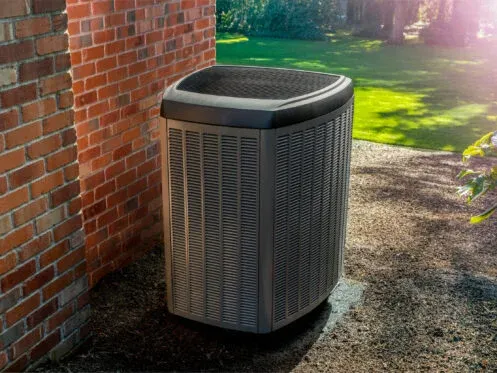Heat pumps are a popular technology in the HVAC industry. A heat pump can replace your home’s heating and air conditioning system, offering a more efficient option for keeping your home comfortable throughout the year. With the emphasis on air conditioning performance in this part of Sacramento, CA, a lot of homeowners want to know if a heat pump will perform effectively as a replacement for an AC unit.
Considering Heat Pump Performance
A heat pump installation will typically match or outperform an air conditioner. This is the case even without factoring in the benefits of a heat pump as a heating system. Here is a look at how it works and what you can expect.
Your Heat Pump Is an Air Conditioner
A heat pump is almost mechanically identical to an air conditioner, operating on the same principles and using the same components. The only difference is the addition of a reversal valve, which allows the system to switch between cooling and heating modes. This is what allows you to replace both an AC unit and a furnace with a heat pump.
The Mechanics of Heat Pumps and ACs
In refrigeration, there is a concept called the vapor-compression cycle. When a refrigerant turns into a gas, it absorbs heat from its surroundings. When it condenses back into a liquid, the refrigerant then releases heat into its surroundings.
Thinking about how an air conditioning unit does its job, the tubing in the interior part of the system collects heat from your house. The refrigerant starts as a cold liquid that absorbs heat from your home. As it goes to the outside as a heated gas, a pressure system cools and condenses the refrigerant. In the process, it releases the heat to the outside. The refrigerant then comes back into your house to repeat the process, now cooled enough to also cool the interior of your house.
This process works the same way in a heat pump. The only difference is that the process is reversible. A heat pump can extract heat from the outside and bring it indoors. This is possible even in cold weather because cold air has more latent heat energy than you might expect.
Similar Efficiency and Performance
You can expect a heat pump to perform similarly to an AC unit with a similar British thermal unit (BTU) capacity and seasonal energy efficiency ratio (SEER) rating. The BTU capacity is the measure of how much air it can cool or heat, with a higher number allowing you to condition air in a bigger space. Likewise, the SEER rating tells you how efficiently the heat pump or AC will operate.
If you’re spending $500 a year to cool your house with a 16-SEER air conditioner, then you can expect to spend $500 to cool it with a 16-SEER heat pump. If they’re both rated at the same BTU level, they will cool the same volume of air at the same rate and for the same price.
Why Heat Pumps Often Outperform ACs
Modern heat pumps are more likely to include variable-speed technologies than air conditioners. A variable-speed system operates at different capacity levels under different conditions. If your heat pump just needs to turn on for a little bit on a day when it is 80 degrees Fahrenheit outside, it will use a lower setting if it supports variable-speed operation.
By comparison, most AC installations are single-speed systems. When an AC comes on, it puts all its capacity to work at once. Whether you’re facing a mild day or a scorching heat wave, the typical air conditioning system uses all its cooling power at once.
Some air conditioning units do come equipped with variable-speed systems. However, you are more likely to find this design on a heat pump. Especially on cool-to-mild days when the heat pump may need to switch from heating to cooling mode and back, it makes a major difference in performance, efficiency, and comfort compared to an HVAC with something like a furnace and an air conditioner.
Intriguingly, heat pumps also tend to offer better humidity control. Particularly, the models with variable-speed systems achieve better humidity control by avoiding excessive cooling. This prevents indoor condensation from forming. Also, some heat pumps offer a dehumidification mode that can dry the air without targeting a specific temperature level. Especially on cool or mild days, this design allows you to focus on dehumidification rather than cooling.
Lifespan Differences
Generally, a modern air conditioner integrated into a whole-house HVAC should have a manufacturer-rated lifetime between 15 and 20 years. It isn’t uncommon for a well-maintained AC unit to go beyond this projection.
In comparison, a heat pump is likely to last between 12 and 15 years. Particularly, the dual-use nature of a heat pump means that it endures more wear and tear over the same period. After all, your air conditioner probably isn’t going to get much of a workout in early January. Conversely, your heat pump still needs to be a heating system at that time. Some people choose to have a backup furnace in their home in addition to a heat pump, especially in cold climates. This can help protect the lifespan of your heat pump.
Annual efficiency declines for types of systems on a similar curve, too. Generally, both will decline in efficiency by about 5% per year without maintenance. With maintenance, both will maintain close to peak cooling capacity for 10 to 12 years.
Upfront and Maintenance Costs
Heat pumps will typically cost about 15% to 20% more than air conditioning units with similar SEER and BTU ratings. The big savings for a heat pump in terms of upfront cost come from removing your home’s heating system entirely. Furthermore, there are often rebates and tax credits available to defray some of the upfront cost of adopting a heat pump.
Maintenance costs annually tend to also be about 20% higher. Note that, once more, this only focuses on the cost of AC maintenance. Heating maintenance for a separate system that accompanies an AC would incur more costs.
Space Savings
Heat pumps take up about the same space as AC units do. However, an air conditioner is almost always paired with some kind of heating system, such as a furnace. With a heat pump, there is no need for an additional heating system. The net effect is that subtracting the heating system will save significant space even though the AC and heat pump are about the same size. Especially if you’re dealing with limited space for an HVAC in your house, we strongly recommend a heat pump.
Heating Efficiency
As much as we want to focus on comparing heat pumps to air conditioners, we would be remiss to ignore the heating side of the equation. Heat pumps maintain 100% heating efficiency down to about 5 degrees Fahrenheit. Sacramento has never recorded an official temperature that low. This part of California is an ideal place for using a heat pump. At Atticman Heating and Air Conditioning, Insulation, we provide full HVAC services in Davis, CA, as well as indoor air quality and ductwork solutions.
Sacramento homeowners looking to learn more about the installation of a heat pump should contact Atticman Heating and Air Conditioning, Insulation in Wilton, CA to schedule an appointment.


